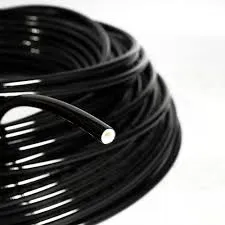Sep . 02, 2024 23:51 Back to list
High-Quality CE Certified Teflon (PTFE) Hoses - Reliable Performance and Durability
Understanding CE Certification for Teflon/PTFE Hose Companies
In the modern industrial landscape, safety and compliance are paramount for manufacturers, particularly in the production of specialized components like Teflon (PTFE) hoses. These hoses are essential in a variety of sectors, including chemical processing, food and beverage, pharmaceuticals, and beyond. An integral part of ensuring the reliability and safety of such products is obtaining CE certification.
What is CE Certification?
CE marking is a certification mark that indicates a product's compliance with European health, safety, and environmental protection standards. The CE stands for Conformité Européenne, which translates to European Conformity. For products sold within the European Economic Area (EEA), CE certification is mandatory and signifies that the product meets all relevant EU directives.
The Importance of CE Certification for PTFE Hoses
For companies producing PTFE hoses, CE certification is vital for several reasons
1. Market Access CE marking enables manufacturers to market their products throughout the EU. Without this certification, companies may face restrictions or outright bans from selling their hoses in European markets.
2. Safety Assurance CE certification demonstrates that the Teflon hoses have undergone rigorous testing and meet established safety standards. This is particularly crucial in industries where failure can lead to catastrophic results.
3. Consumer Confidence The presence of a CE mark on PTFE hoses instills confidence in end-users. Customers know that these products have been evaluated for quality and safety, making them more likely to choose certified products.
4. Legal Compliance Compliance with EU regulations reduces the risk of legal liabilities for manufacturers. Non-compliance can lead to fines, penalties, or product recalls, which can be detrimental to a company’s reputation and bottom line.
ce certification teflon/ptfe hose companies

Steps to Achieve CE Certification
Achieving CE certification for PTFE hoses involves several critical steps
1. Identify Relevant Directives Manufacturers must first identify which EU directives apply to their products. This could include directives related to machinery safety, pressure equipment, or environmental protection.
2. Conduct Risk Assessment A thorough risk assessment should be performed to identify potential hazards associated with the product. This process involves evaluating the material properties of Teflon, its applications, and the operating conditions of the hoses.
3. Testing and Documentation PTFE hoses must undergo extensive testing to ensure they conform to established standards. This may include tests for pressure resistance, chemical compatibility, and temperature tolerance. All results must be documented meticulously.
4. Technical File Creation Manufacturers need to compile a technical file that includes design specifications, test results, and user instructions. This file is vital for inspection by regulatory authorities.
5. Declaration of Conformity Finally, the manufacturer must issue a Declaration of Conformity, affirming that the PTFE hoses meet all relevant standards and directives. Once this is completed, the product can be affixed with the CE mark.
Conclusion
For companies in the Teflon/PTFE hose manufacturing sector, obtaining CE certification is a crucial step in ensuring product quality, safety, and marketability. With the right approach to compliance and a commitment to maintaining high standards, these manufacturers can successfully navigate regulatory requirements and build trust with their customers, paving the way for growth and expansion in a competitive market.
-
Best Four Steel Wire Spiral Hose Hydraulic R12 – Durable High-Pressure Hose Manufacturer
NewsJul.08,2025
-
High-Quality 1/4 Hydraulic Hose – Soft, Flexible & Durable Rubber Hoses for Industrial Use
NewsJul.08,2025
-
1 1 2 Inch Hydraulic Flexible Hose - Durable, Reliable, High-Pressure Solutions
NewsJul.07,2025
-
High-Quality 1 2 Rubber Hose - Durable, Flexible Hydraulic Solutions
NewsJul.07,2025
-
Discover SAE Hydraulic Hose Types - High Quality & Durable Hoses from Leading Factory Supplier
NewsJul.06,2025
-
High Pressure Wire Hydraulic Rubber Hose Supplier Durable & Reliable 1SN Hose Solutions
NewsJul.06,2025
